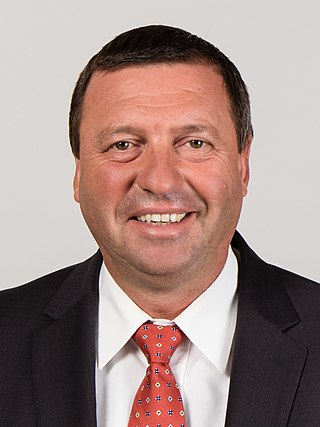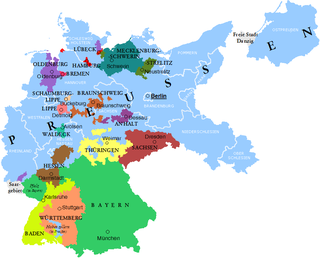Related Research Articles

The new states of Germany are the five re-established states of the former German Democratic Republic (GDR) that unified with the Federal Republic of Germany (FRG) with its 10 "old states" upon German reunification on 3 October 1990.

The 2024 Thuringian state election was held on 1 September 2024 to elect the members of the 8th Landtag of Thuringia. It was held on the same day as the 2024 Saxony state election.

Volkmar Uwe Vogel is a German politician of the Christian Democratic Union (CDU) who served as a member of the Bundestag from the state of Thuringia from 2002 until 2021.

Susanne Hennig-Wellsow is a German politician. She was federal co-chairwoman of The Left from 2021 to 2022 and has served as a member of the Bundestag for Thuringia since 2021. Previously, she was a member of the Landtag of Thuringia from 2004 to 2021, leader of the Thuringia branch of The Left since November 2013, and leader of the state parliamentary group since December 2014.

Ann-Sophie Bohm-Eisenbrandt is a German politician of Alliance 90/The Greens. She has been the co-spokesperson of the party in Thuringia since January 2020. She is a member of the Weimar city council and leader of the Greens group in the council.
Erfurt II is an electoral constituency represented in the Landtag of Thuringia. It elects one member via first-past-the-post voting. Under the current constituency numbering system, it is designated as constituency 25. It contains central and western parts of Erfurt, the capital and largest city of Thuringia.

Anja Siegesmund is a German politician of Alliance 90/The Greens. Between 2014 and 2023, she served as Minister of the Environment in the state government of Thuringia in the coalition government of Bodo Ramelow. Until 31 January 2023, she was also Second Deputy Minister-President of Thuringia. From 2009 to 2014 she was leader of the Greens parliamentary group in the Landtag of Thuringia. She was a member of the Landtag from 2009 to 2015, then again from 2019 to 2020. In December 2022 she announced her imminent resignation from her political offices; on 1 February 2023 she was succeeded by Bernhard Stengele.
The 1927 Bremen state election was held on 13 November 1927 to elect the 120 members of the Bürgerschaft of Bremen.
The 1927 Hessian state election was held on 13 November 1927 to elect the 70 members of the Landtag of Hesse.
The 1920 Thuringia state election was held on 20 June 1920 to elect the 53 members of the Landtag of Thuringia.
The 1921 Thuringia state election was held on 11 September 1921 to elect the 54 members of the Landtag of Thuringia.
The 1924 Thuringia state election was held on 10 February 1924 to elect the 72 members of the Landtag of Thuringia.
The 1929 Thuringia state election was held on 8 December 1929 to elect the 53 members of the Landtag of Thuringia.
The 1932 Thuringia state election was held on 31 July 1932 to elect the 61 members of the Landtag of Thuringia.
The 1927 Mecklenburg-Schwerin state election was held on 22 May 1927, with re-elections being held on 11 December 1927 in Grambow-Wendischhof and Sietow, to elect the 52 members of the Landtag of the Free State of Mecklenburg-Schwerin.
The 1927 Mecklenburg-Strelitz state election was held on 3 July 1927 to elect the 35 members of the Landtag of the Free State of Mecklenburg-Strelitz.
Elections in the Free Hanseatic City of Bremen (Freie Hansestadt Bremen) to its state parliament, the Bürgerschaft, during the Weimar Republic were held at variable intervals between 1919 and 1930. Results with regard to the total vote, the percentage of the vote won and the number of seats allocated to each party are presented in the tables below. On 31 March 1933, the sitting Bürgerschaft was dissolved by the Nazi-controlled central government and reconstituted to reflect the distribution of seats in the national Reichstag. The Bürgerschaft subsequently was formally abolished as a result of the "Law on the Reconstruction of the Reich" of 30 January 1934 which replaced the German federal system with a unitary state.

Landtag elections in the People's State of Hesse (Volksstaat Hessen) during the Weimar Republic were held at irregular intervals between 1919 and 1932. Results with regard to the total vote, the percentage of the vote won and the number of seats allocated to each party are presented in the tables below. On 31 March 1933, the sitting Landtag was dissolved by the Nazi-controlled central government and reconstituted to reflect the distribution of seats in the national Reichstag. The Landtag subsequently was formally abolished as a result of the "Law on the Reconstruction of the Reich" of 30 January 1934 which replaced the German federal system with a unitary state.

Landtag elections in the Free State of Thuringia (Freistaat Thüringen) during the Weimar Republic were held at irregular intervals between 1920 and 1932. Results with regard to the total vote, the percentage of the vote won and the number of seats allocated to each party are presented in the tables below. On 31 March 1933, the sitting Landtag was dissolved by the Nazi-controlled central government and reconstituted to reflect the distribution of seats in the national Reichstag. The Landtag subsequently was formally abolished as a result of the "Law on the Reconstruction of the Reich" of 30 January 1934 which replaced the German federal system with a unitary state.
Landtag elections in the Free State of Mecklenburg-Strelitz (Freistaat Mecklenburg-Strelitz) during the Weimar Republic were held at irregular intervals between 1918 and 1932. Results with regard to the total vote, the percentage of the vote won and the number of seats allocated to each party are presented in the tables below. On 31 March 1933, the sitting Landtag was dissolved by the Nazi-controlled central government and reconstituted to reflect the distribution of seats in the national Reichstag. The Landtag subsequently was formally abolished as a result of the "Law on the Reconstruction of the Reich" of 30 January 1934 which replaced the German federal system with a unitary state.
References
- 1 2 Gonschior, Andreas. "Das Land Thüringen Landtagswahl 1927". Wahlen in der Weimarer Republik. Archived from the original on 2001-05-30. Retrieved 18 May 2021.
- ↑ Schröder, Valentin. "Landtagswahlen Freistaat Sachsen". Wahlen in Deutschland. Archived from the original on 2016-03-24. Retrieved 18 May 2021.